Iran’s Leader Boasts Of Public Support, Dismisses Protests
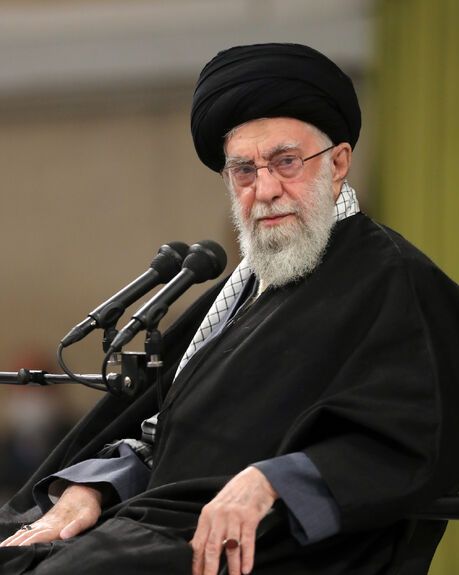
Iran’s ruler Ali Khamenei says the turnout during the 44th anniversary of the Islamic Republic showed “full support” for the Islamic Revolution and the regime.

Iran’s ruler Ali Khamenei says the turnout during the 44th anniversary of the Islamic Republic showed “full support” for the Islamic Revolution and the regime.
The 83-year-old autocrat made the remarks Wednesday during a meeting with a group of people from Iran’s East Azerbaijan Province and said that voice of the Iranian people during the anniversary was louder than all other voices.
His remarks come as most European diplomats boycotted the government-organized anniversary events and reports from Iran say the turnout in rallies was much lower than in previous years.
Coinciding with the anniversary, dozens of cities around the world witnessed protests against the clerical regime on Saturday, February 11.
Just in Los Angeles, an estimated 80,000 Iranians held a massive rally to show anger at Khamenei and his regime’s brutality.
However, Khamenei claimed, “This last Saturday was a historic day. People literally created an epic across the country.”
“Of course, there are and there were opposing and dissident voices. The enemies – the world’s media empire, which is in the hands of the Zionists and the Americans – tried to make the [opposing] voices prevail, but no; [they] could not. The voice of the nation prevailed over the voice of others.”
Iran has been the scene of anti-regime protests since September following the death in custody of Mahsa Amini. Security forces have killed over 500 people and arrested thousands of others.
Khamenei has been blaming the United States and its allies for instigating the protests.
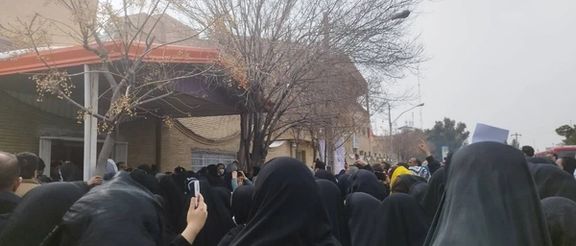
Family members of schoolgirls who have shown symptoms of a mysterious poisoning protested Tuesday outside the office of the governor of the religious city of Qom.
Around 200 students and at least one teacher in 12 different girls’ schools have reported symptoms such as nausea, headaches, coughing, difficulty breathing, heart palpitations, and lethargy since November 30 when 18 students of a secondary school fell ill with similar symptoms. Two weeks later 51 students fell ill in the same school again.
The education department had to close all schools in Qom for two days last week after several other schools were affected, causing a public scare. When students returned Sunday after the weekend and a public holiday Saturday, 37 girls in three different schools fell ill again.
In a commentary Tuesday published by Qom News, Nafiseh Moradi, an Islamic studies researcher at Tehran’s Al-Zahra University, speculated that ultra-religious groups with beliefs similar to those of the Taliban in Afghanistan may be behind the mysterious poisonings.
Moradi said the Taliban’s ban on girls’ education may have inspired the ultra-religious in Qom to carry out attacks on schools for girls to instill fear in students and their families with the ultimate aim of keeping them at home. She advised the authorities to hold classes online until the perpetrators of these terrorist attacks are identified.
Some of the students have had to be hospitalized for up to a week due to the severeness of their symptoms but most others were released within hours. In some cases, symptoms have lasted for weeks.
“We don’t want unsafe schools!”, “Schools must be secured,” “Answer us Mr. Governor!”, hundreds of protesters chanted while also calling the governor “scoundrel” for failing to investigate and address the poisonings in several girls schools.
The city of Qom with a population of over 1.2 million is home to most of Iran's religious seminaries and the popular shrine of Masoumeh, sister of Imam Reza, the eighth imam who is buried in Mashhad.
“You must ensure the safety of our children,” one of the parents shouts in a video posted on social media while others cheer. He says his solution to the problem is not sending his children to school anymore.
So far, authorities have not found the cause of the mysterious illness. Some of the victims have reported falling ill after an aroma, resembling tangerines, filled the air in the classrooms.
Deputy head of Qom Medical Sciences University, Dr. Majid Mohebbi, told the Revolutionary Guards linked Tasnim news agency Monday that MRI and other tests carried out on the affected students all came out normal, and nothing was detected in samples taken from the students and the classrooms. He also stressed that the cause of the illness could not be carbon monoxide poisoning from the heating systems.
Tasnim and other state media refrain from mentioning that the mysterious poisonings happen only in girls’ schools, but many believe it may be intentional targeting of female students. According to Qom News, authorities have been trying to hush the media reporting of the incidents and their cause.
Mojtaba Zolnuri, the representative of Qom in the parliament, has said that there is no doubt that the poisonings is intentional and “a matter of [national] security.”
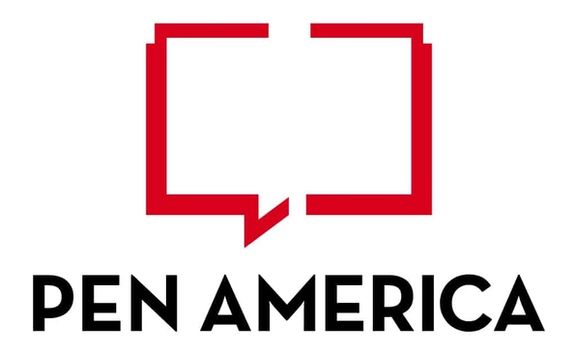
Pen America has condemned summoning Reza Khandan, the husband of a prominent Iranian human rights lawyer Nasrin Sotoudeh.
PEN America, founded in 1922 and headquartered in New York City, is a nonprofit organization that works to defend and celebrate free expression in the United States and worldwide through the advancement of literature and human rights.
Karin Deutsch Karlekar, director of PEN America’s Expression at Risk programs, released a statement Tuesday saying Khandan’s summoning is another attempt to intimidate and silence Sotoudeh.
“The summons recently issued to Reza Khandan, which will pull him away from his family and into Iran’s notorious and overcrowded prisons, is an outrage,” reads the statement.
“For more than a decade, his wife Nasrin Sotoudeh has been a leading voice of conscience in Iran, working, writing, and speaking out against injustice and in support of fundamental human rights and the rule of law,” added Karlekar.
Kalekar also called for a review and cancellation of Khandan’s sentence.
Khandan was summoned February 13by the judiciary to serve his prison term. He was sentenced to six years in jail in 2019, along with Farhad Meysami, a doctor and civil activist, but the implementation of his sentence was postponed.
He was summoned a few days after his wife's interview with the CNN about Iran's protests.
In this interview, Nasrin Sotoudeh emphasized that despite government repressions, the people of Iran still want a referendum and a regime change.
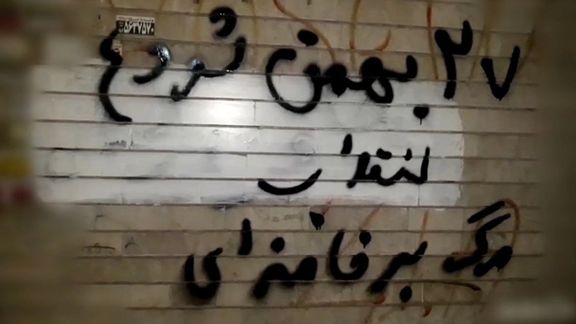
Despite many parts of Iran being covered in snow, people continue to write slogans on walls and distribute flyers and posters calling for fresh protests.
They call for protests planned for February 16, which marks the 40th day after the execution of Mohammad-Mehdi Karami and Mohammad Hosseini, two of the four Iranians who were hanged for their participation in antigovernment rallies.
The 40th day of a loved one’s death – as well as the seventh day -- carries immense cultural significance in Iran, and in case of an unjust killing, such as the young protesters killed by security agents, the occasion turns into public mourning and fuels angry protests.
Graffiti on walls and fliers proclaim, "Start of the revolution."
Karami and Hosseini had been arrested in the city of Karaj during demonstrations om the 40th day of another victim, Hadis Najafi. Holding such events is reminiscent of a similar turn of events 44 years ago, during the Islamic revolution against monarchy that culminated in the overthrow of the Pahlavi dynasty under Shah Mohammad Reza Pahlavi, and the establishment of the Islamic Republic in 1979. Marking the 40th day for people who were killed during the revolution turned into fresh protests that fueled the movement.
A young woman without veil writes, "Death to Khamenei"
Following more than five months of protests, numerous calls made by Iranian politicians from across the spectrum to do away with violent crackdown, finally prompted the government to reluctantly announce a partial amnesty for jailed protesters and promises to release more prisoners including intellectuals.
But February 16 will be the day the regime shows its true colors to the world again.
Young grassroot activists in Tehran -- calling themselves Youths of Tehran’s Neighborhood (Javanan-e Tehran) -- that have mobilized thousands of protesters in several towns and cities during the current unrest, have called on people to gather at main streets and squares of their cities in the evening. "The child-killing regime of the Islamic Republic will soon come to an end and all together we will turn this shameful page of our history," read their statement.
The voice in this video says all Qasem Soleimani murals have been defaced
Many videos from several cities have surfaced on social media showing people having written the date, February 16, on walls and vowing “the start of the revolution.” The Islamic Republic, pretending that the situation is back to normal, is pushing singers and celebrities to hold events that were almost nonexistent during the past five months. But people use the events, such as a concert by Sirvan Khosravi recently, to chant antigovernment slogans and the main motto of the uprising: Women, Life, Freedom.
In addition to nationwide protests, Iranian diaspora communities have also planned another protest rally for February 20 outside the European Parliament in the Belgian capital Brussels. The gathering is meant to call on the European Union countries to designate the Revolutionary Guard – or the IRGC – as a terrorist organization. Thousands of Iranians from all over Europe held a massive rally in Strasbourg in January to pressure the European countries to list the IRGC.
Iranians staged mass rallies in dozens of cities across the world calling for the overthrow of the Islamic Republic on Saturday [February 11], concurrent with the regime-sponsored events inside Iran to mark the 44th anniversary of the Islamic Republic in 1979.
In their historic joint event in Washington on the eve of the rallies on February 10, eight prominent opposition figures held a joint forum, signaling the emergence of a leadership council in the diaspora to campaign for international support in favor of Iran’s protest movement. They also called for support from democratic countries to change the regime in Iran and establish democracy.
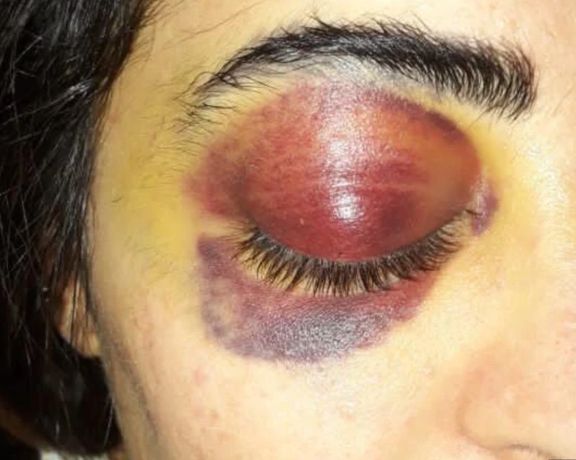
A young protester says a Revolutionary Court in Iran has sentenced her to 11 years in prison and 124 hours of "washing graves".
Mina Yaqoubi, a 33-year-old bodybuilding trainer from the city of Arak, said in a video Monday that “I was tortured and interrogated 12 hours a day, and now I have been sentenced to 11 years behind bars, 124 hours of grave cleaning, 85 lashes, and two years of exile.”
The Arak judiciary had previously announced she was arrested on a charge of "throwing rocks at martyrs graves".
On December 1, a video of Mina Yaqoubi on social media showed her being released from prison on bail, but what caught everyone's attention was her weak body and bruised eyes suggesting she was tortured in prison.
Following the controversy caused by the video, the judiciary claimed in an announcement "Due to some previous mental and emotional problems during the detention, she attempted suicide twice. She jumped off the second floor of the women’s ward, but with the vigilance of the caregivers, she suffered minor injuries such as bruises on her face."
However, Yaqoubi rejected the narrative of the judiciary saying she kept her silence for almost three months to see if there would be any reduction in punishment, but her final verdict is now issued.
The Islamic Republic showed an iron fist during the nationwide protests following the death of Mahsa Amini in mid-September killing more than 500 protesters and detaining tens of thousands of other protesters.

Calls for mass protests on February 20 is gaining momentum outside Iran with several key figures are asking compatriots to stage anti-regime protests.
Alireza Akhundi and Darya Safai, two representatives of Iranian origin in the parliaments of Sweden and Belgium called on Iranians to gather in front of the European Council building in Brussels Monday and support the inclusion of the IRGC in the list of terrorist organizations in the European Union.
Activists Masih Alinejad and Hamed Esmaeilion also welcomed the call saying that they will participate in the February 20 gathering of Iranians in Brussels to support the designation of the IRGC as a terrorist in the European Union.
Meanwhile, people inside Iran chanted anti-government slogans in Karaj, west of Tehran, and different neighborhoods of capital Tehran, as in previous months.
They also distributed flyers to invite people to participate in a protest rally on Thursday.
Thursday marks the 40th day after the execution of Mohammad Hosseini and Mohammad Mehdi Karami.
The two young men, who were arrested during the protests in Karaj, were executed without having access to fair trial and lawyers.
Street protests, gatherings, overnight slogans, writing graffiti and other forms of civil disobedience are still going on inside and outside the country, five months into the uprising against the clerical rulers.